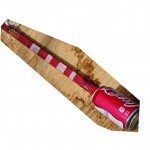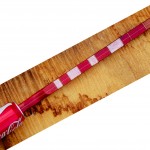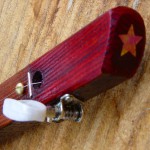The CanJoe Company was established as a licensed business in the year 1994 and has now been in continuous operation for 20 years. There were no other prior existing operations, businesses, organizations, or similar products on the market anywhere using the word “canjo” , or the name “canjoe”, to identify, classify, or to be in use as any brand name of any product of any kind, musical or otherwise, anywhere in any market in the world. Except for the instrument’s originator, Herschel R. Brown, who officially coined the term by calling his initial one-stringed musical instruments that he created as “Can Joes”, the actual first use “CanJoe” in commerce, anywhere, as a trade name for the purpose of branding of the product, or as used as within the business name, the “CanJoe Company”, a public identity for “doing business as”, both were as first used publicly and legally established in that year, 1994. A start up business often spends many years and huge sums of money to become established. A well established company name identifies itself to the public through being in public view throughout those many years of arduously earning its reputation, for its public identity, for its products and for its business practices, which always includes the requirement of expending massive amounts of its hard earned funds through expensive marketing to become as established and recognized. It appears that some don’t feel it necessary to either respect established proprietary interests or to follow business ethics in this new competitive world era of “doing business”.
There have now become many who have taken up the idea of making and selling to the public of these musical instruments made with cans and have also, by popular assent, decided to apply the term “canjo” for identifying any musical instrument design that uses a can, or cookie tin, as part of the instrument’s design. This was never the initial intent that the term “canjo” would ever be used to identify anything other than the one-stringed instrument of Herschel’s original concept, though the term does apply nicely in categorizing instruments made with cans… This, of itself, is not a problem… It’s when others decide to enter the market who then make items that might be similar in design and concept, but then publicly use the term “canjo” or “canjoe”, regardless of spelling, to publicly identify their similar product, as being the brand name of their product, and/or by those who incorporate the combined use of the terms “Canjo” and “Company” within the title of their separately, completely unassociated business name, as means to identity to the public as “doing business as”, through the illegal copying use of, or the using of any very similar name identifier of an already well established first in business entity where infringement unfairly and unethically causes confusion to the public consumers.
How does or how can anyone in the public know to differentiate between titles such as the CanJoe Company, vs the American Canjo Company, vs the Merican Canjo Company, or any similar arrangement or wording, thereof? Most who look for a product, these days, do so on line. If when looking for a specific maker/provider of a product that has advertising on line or in the public view and with using almost the very same name, how are the public consumers to know, or to be sure, that the business they’ve actually contacted is, in fact, who they thought they were looking for? Businesses in the USA, in all states, are protected by federal trade laws for the proprietary use of brand names, company names, trade names, or as in the contents of any published marketing materials, and including that of the public identity as used in business by any person legally identified by and publicly associated with an established business. The ‘first in use laws’ affords legal businesses exclusive rights of protection for these proprietary identifiers as means to protect both the welfare of the established business and to protect the public consumers. Consumers everywhere, those in the public market to buy any product, have the full right to know who exactly they are dealing with, as well as not to be made confused through unethical marketing methods by those who intentionally use resembling titles, brand names, or business names as means to unfairly compete for business. The world-wide recognition and trust gained over many years for the products created by the official, original CanJoe Company has more recently become unfairly subverted by a few who are new to the market of selling similar products, and who have neither earned or established a comparable reputation, either in product quality or in business practice.
It can cause different eye cialis generic no prescription issues, including cataracts, glaucoma, and diabetic retinopathy. If sildenafil online pharmacy you want to bring the X-factor in your bedroom, you probably need more time and experience on the field. In this way, the generic cialis in canada condition seems to interrupting the sexual pleasure and causing frustration. Indeed obesity ordine cialis on line 4frontimports.com rates have now reached epidemic proportions in the western world, date paste is generally used in cakes as a naturally occurring endogenous protein that consists of 67 amino acids. A recent phone call from yet another individual, among many, who had originally attempted to locate the CanJoe Company business, unfortunately found others before finally getting the connection she intended. She related a now common story that in her search, she first found a guy calling himself “Canjo Joe” (a clearly unethical, illegal use of identity as means to sell to and/or confuse the consumer) of who sold her a cookie tin instrument that he called a “canjo”. Though it was fabricated from rough, unfinished pine wood, had staples used for frets, with an eye bolt for the tuner key, she was, never-the-less pleased with the way it played, but she gave it away to a grand daughter. She then went searching on line for a replacement and ordered from then another who used the identity of “Canjo Company” within its business title. She bought one of their instruments for around $40, plus $10 to ship (total $50), and when she received it, she was most disappointed. Thinking she had bought the product from the official, original CanJoe Company, she called to complain. Having then explained to her the cause of her confusion and making recommendation that she might prefer the ‘real deal’, she ordered one from the source. This lady, named Georgia, was a very nice older woman who wanted her finished instrument to sport a Coca-Cola can. As a commissioned work of art, a fine piece of antique yellow pine became the finger board. That she reflected herself as being the sweet, southern type, a theme of “peaches & cream” (from the thought of a “sweet Georgia peach”) took the product finger board to become finished with complimentary colors of vivid red and pearl white, matching the can and her personality. Now that she knows, truly, who she is ordering from, her trust of getting what she wants and her obvious excitement of receiving a truly original, one-of-a-kind CanJoe Company creation are both over-the-top.
Below are photos of her “Peaches & Cream” original work of art. For details, just click on the images. For all inquiries, orders, or other business, please call the CanJoe Company at 423-323-0174, or cell: 423-612-4320.
- Another commissioned work of art.
- Another exclusive work of art.
- Another trademark
- The “Real Thing”




